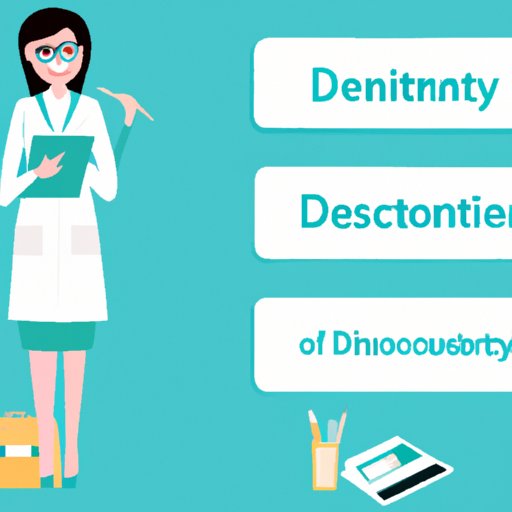Introduction
Dental hygiene is a specialized field of healthcare that focuses on preventing and treating oral diseases and conditions. Dental hygienists provide patients with preventative and therapeutic treatments to improve their oral health. They are also responsible for educating patients about proper oral hygiene practices. Becoming a dental hygienist requires dedication and commitment to your education and training.
Overview of Dental Hygiene
Dental hygienists are licensed health care professionals who specialize in preventive and therapeutic treatments related to oral health. They are responsible for examining patients’ teeth, gums, and other soft tissues of the mouth to diagnose and treat any problems. Dental hygienists also work with dentists to develop treatment plans for patients. This includes cleaning teeth and providing advice on how to maintain good oral hygiene.
Why Become a Dental Hygienist?
There are many reasons why someone may want to become a dental hygienist. For starters, it is a rewarding career that helps people maintain their oral health. Dental hygienists also enjoy job security and a competitive salary. Additionally, the hours are often flexible, allowing for a better work-life balance. Finally, there are many professional opportunities available for those in the field, such as teaching, research, and administrative positions.
Educational Requirements
To become a dental hygienist, you will need to complete an accredited dental hygiene program. These programs usually take two to three years to complete and require a high school diploma or equivalent. During your studies, you will learn about the anatomy and physiology of the mouth, dental materials, and techniques for cleaning teeth. You will also receive instruction in dental office procedures, patient management, and pharmacology.
Once you have completed your studies, you will need to obtain licensure in the state in which you plan to practice. Most states require dental hygienists to pass a written and clinical examination in order to be eligible for licensure.
Role of a Dental Hygienist
The primary role of a dental hygienist is to prevent and treat oral health problems. This includes identifying and diagnosing gum disease, cavities, and other oral health issues. Dental hygienists also clean teeth to remove plaque and tartar buildup. They may also use special instruments to detect and measure periodontal pockets in the gums.
In addition to preventive measures, dental hygienists also provide therapeutic treatments. This includes applying sealants, fluoride treatments, and desensitizing agents. They may also administer local anesthetics to help alleviate pain and discomfort during dental procedures.

Benefits of Being a Dental Hygienist
Being a dental hygienist offers many advantages. For starters, it is a secure profession with excellent job prospects. According to the Bureau of Labor Statistics, employment of dental hygienists is projected to grow 11 percent from 2019 to 2029, much faster than the average for all occupations.
Another benefit of being a dental hygienist is the flexible schedule. Many dental offices offer part-time or evening hours, allowing you to maintain a healthy work-life balance. Additionally, dental hygienists earn a competitive salary. The median annual wage for dental hygienists was $76,220 in May 2020, according to the U.S. Bureau of Labor Statistics.
Daily Responsibilities
As a dental hygienist, your daily duties will vary depending on the office where you work. However, some of the most common tasks include developing treatment plans, cleaning teeth, and educating patients about proper oral hygiene practices. You may also be responsible for taking x-rays, charting patient information, and sterilizing instruments.
In addition to these routine tasks, it is important to stay up-to-date on the latest advancements in the field. This includes reading professional journals and attending continuing education courses. By doing so, you can ensure that you are providing the best possible care for your patients.
Professional Opportunities
For those looking to advance their career, there are numerous professional opportunities available. For example, you may choose to pursue a master’s degree in dental hygiene or a related field. This can lead to teaching or research positions at universities or dental schools. Alternatively, you may decide to pursue administrative positions, such as working in public health or in a corporate office.
Conclusion
Becoming a dental hygienist is a rewarding career that provides job security, a flexible schedule, and a competitive salary. It is also a great way to make a difference in people’s lives by helping them maintain their oral health. To become a dental hygienist, you will need to complete an accredited dental hygiene program and obtain licensure in the state in which you plan to practice. After completing your studies, you can explore professional opportunities such as teaching, research, and administrative work.
By understanding the educational requirements, role of a dental hygienist, and benefits of being a dental hygienist, you can make an informed decision about whether this is the right career path for you. With hard work and dedication, you can make a positive impact on the lives of your patients.
(Note: Is this article not meeting your expectations? Do you have knowledge or insights to share? Unlock new opportunities and expand your reach by joining our authors team. Click Registration to join us and share your expertise with our readers.)
